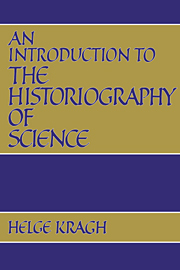Book contents
- Frontmatter
- Contents
- Preface
- 1 Aspects of the development of the history of science
- 2 History of science
- 3 Objectives and justification
- 4 Elements of theory of history
- 5 Objectivity in history
- 6 Explanations
- 7 Hypothetical history
- 8 Structure and organization
- 9 Anachronical and diachronical history of science
- 10 Ideology and myths in the history of science
- 11 Sources
- 12 Evaluation of source materials
- 13 Scientists' histories
- 14 Experimental history of science
- 15 The biographical approach
- 16 Prosopography
- 17 Scientometric historiography
- Notes
- Bibliography
- Index
7 - Hypothetical history
Published online by Cambridge University Press: 30 November 2009
- Frontmatter
- Contents
- Preface
- 1 Aspects of the development of the history of science
- 2 History of science
- 3 Objectives and justification
- 4 Elements of theory of history
- 5 Objectivity in history
- 6 Explanations
- 7 Hypothetical history
- 8 Structure and organization
- 9 Anachronical and diachronical history of science
- 10 Ideology and myths in the history of science
- 11 Sources
- 12 Evaluation of source materials
- 13 Scientists' histories
- 14 Experimental history of science
- 15 The biographical approach
- 16 Prosopography
- 17 Scientometric historiography
- Notes
- Bibliography
- Index
Summary
Because of their placement in the past, historical occurrences cannot be re-created or manipulated. For this reason hypothetical or contrary-to-fact statements are often regarded as unacceptable in historical works. Thus Joseph Needham says: ‘Whether a given fact would have got itself discovered by some other person than the historical discoverer had he not lived it is certainly profitless and probably meaningless to enquire.’
A contrary-to-fact statement is a statement based on an assumption that is known to be factually false, in other words, that cannot be reconciled with the known facts. Such statements are also called counterfactual statements. They contain the conditional ‘if’ followed by the false statement P. ‘If X had not been the case, Y would not have taken place’ is a counterfactual statement in so far as X actually was the case (irrespective of whether Y occurred or not). X might, for example, be ‘Maxwell formulated the theory of electrodynamics’ and Y might be ‘the radio was invented’. In a certain sense the statement can be said to be a hypothetical statement about the past; but with the difference that the premise of the hypothesis (non-X) is known to be false. Hypotheses are normally statements whose truth value is not known, but which are used heuristically in order to deduce testable statements that will then support or weaken the hypothesis.
We cannot know whether the radio would have been discovered had Maxwell never lived; for we cannot remake the historical situation at the time of Maxwell without taking into consideration the fact that Maxwell did actually live.
- Type
- Chapter
- Information
- An Introduction to the Historiography of Science , pp. 70 - 74Publisher: Cambridge University PressPrint publication year: 1987



